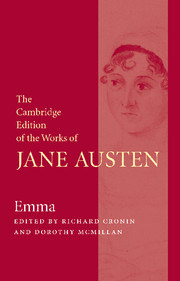Chapter 16
Published online by Cambridge University Press: 18 December 2020
Summary
IT was a very great relief to Emma to find Harriet as desirous as herself to avoid a meeting. Their intercourse was painful enough by letter. How much worse, had they been obliged to meet!
Harriet expressed herself very much, as might be supposed, without reproaches, or apparent sense of ill usage; and yet Emma fancied there was a something of resentment, a something bordering on it in her style, which increased the desirableness of their being separate.—It might be only her own consciousness; but it seemed as if an angel only could have been quite without resentment under such a stroke.
She had no difficulty in procuring Isabella's invitation; and she was fortunate in having a sufficient reason for asking it, without resorting to invention.—There was a tooth amiss. Harriet really wished, and had wished some time, to consult a dentist. Mrs. John Knightley was delighted to be of use; any thing of ill-health was a recommendation to her—and though not so fond of a dentist as of a Mr. Wingfield, she was quite eager to have Harriet under her care.—When it was thus settled on her sister's side, Emma proposed it to her friend, and found her very persuadable.—Harriet was to go; she was invited for at least a fortnight; she was to be conveyed in Mr. Woodhouse's carriage.—It was all arranged, it was all completed, and Harriet was safe in Brunswick Square.
Now Emma could, indeed, enjoy Mr. Knightley's visits; now she could talk, and she could listen with true happiness, unchecked by that sense of injustice, of guilt, of something most painful, which had haunted her when remembering how disappointed a heart was near her, how much might at that moment, and at a little distance, be enduring by the feelings which she had led astray herself.
The difference of Harriet at Mrs. Goddard's or in London, made perhaps an unreasonable difference in Emma’s sensations; but she could not think of her in London without objects of curiosity and employment, which must be averting the past, and carrying her out of herself.
- Type
- Chapter
- Information
- Emma , pp. 492 - 502Publisher: Cambridge University PressPrint publication year: 2005

